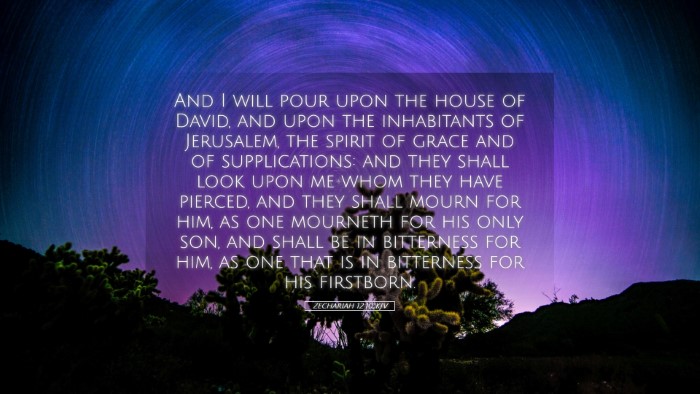Old Testament
Genesis Exodus Leviticus Numbers Deuteronomy Joshua Judges Ruth 1 Samuel 2 Samuel 1 Kings 2 Kings 1 Chronicles 2 Chronicles Ezra Nehemiah Esther Job Psalms Proverbs Ecclesiastes Song of Solomon Isaiah Jeremiah Lamentations Ezekiel Daniel Hosea Joel Amos Obadiah Jonah Micah Nahum Habakkuk Zephaniah Haggai Zechariah MalachiZechariah 12:10
Zechariah 12:10 KJV
And I will pour upon the house of David, and upon the inhabitants of Jerusalem, the spirit of grace and of supplications: and they shall look upon me whom they have pierced, and they shall mourn for him, as one mourneth for his only son, and shall be in bitterness for him, as one that is in bitterness for his firstborn.
Zechariah 12:10 Bible Commentary
Commentary on Zechariah 12:10
Zechariah 12:10 states:
"And I will pour upon the house of David, and upon the inhabitants of Jerusalem, the spirit of grace and of supplications: and they shall look upon me whom they have pierced, and they shall mourn for him, as one mourneth for his only son, and shall be in bitterness for him, as one that is in bitterness for his firstborn."
Introduction
The verse in question, Zechariah 12:10, presents profound theological significance. It speaks of a divine promise and a revelation of grace combined with sorrow, highlighting the themes of repentance and the recognition of the Messiah. This commentary synthesizes insights from renowned public domain theologians such as Matthew Henry, Albert Barnes, and Adam Clarke, offering a comprehensive exploration aimed at enriching the understanding of pastors, students, and scholars.
The Promise of the Spirit
The first part of the verse declares, "And I will pour upon the house of David, and upon the inhabitants of Jerusalem, the spirit of grace and of supplications." Here, the notion of divine outpouring is crucial.
- Matthew Henry interprets this as God’s promise to bestow His Spirit upon His people, suggesting that this outpouring of grace would lead to a renewed heart capable of sincere supplication and acknowledgment of sin.
- Albert Barnes adds that this passage indicates a time when the inhabitants of Jerusalem will experience a transformative grace that leads them to genuine repentance and supplication, reflecting a deep longing for reconciliation with God.
- Adam Clarke emphasizes the significance of “the house of David” as a representation of the messianic line, suggesting that this promise highlights God’s patience and desire to restore His people.
The Acknowledgment of the Pierced One
The latter part of the verse states, "and they shall look upon me whom they have pierced." This line is rich with prophetic vision.
- Matthew Henry highlights that the term "pierced" points to Christ's crucifixion, shedding light on the New Testament fulfillment of this prophecy, where Jesus is recognized as the Messiah who suffers for humanity.
- Albert Barnes draws attention to the dual significance of "looking upon"—it denotes both physical sight and an understanding that leads to recognition. He emphasizes the profound impact of this recognition on the people of Israel.
- Adam Clarke notes the historical context of Israel's rejection of Christ, positing that this verse depicts a future revelation where the nation will finally recognize their Messiah, emphasizing the grace in their ultimate acknowledgment of Him.
The Response: Mourning and Bitterness
The verse concludes with the people's response: "and they shall mourn for him, as one mourneth for his only son, and shall be in bitterness for him, as one that is in bitterness for his firstborn."
- Matthew Henry interprets this mourning not merely as sorrow over past wrongs but as a deep, heartfelt mourning reflecting the relationship that God desires with His people—one characterized by intimacy and recognition of losses endured.
- Albert Barnes further elaborates that the description of mourning as akin to the loss of an only son gives testament to the depth of grief and realization that the nation had a hand in the suffering of their Savior.
- Adam Clarke underscores that this bitter mourning will be a sign of genuine repentance, leading to a transformed community—a necessary step for the restoration of the covenantal relationship with God.
Theological Implications
The implications of Zechariah 12:10 extend well beyond its immediate context, influencing Christian theology concerning the nature of repentance, grace, and the acknowledgment of Christ.
- The Spirit of Grace: The outpouring of the Spirit is seen as a vital component for understanding and achieving true repentance. As Pastors, this illustrates the necessity of inviting the Holy Spirit into the life of a congregation for transformative change.
- Recognition of Christ: The acknowledgment of Christ's suffering and the understanding of its significance can foster a deeper love and appreciation for salvation among believers, challenging them to reflect on their own roles in the crucifixion.
- Community Mourning: The concept of communal grief and repentance illustrates a profound truth that the sins of individuals impact the community as a whole, urging leaders to promote collective confession and healing within the church.
Conclusion
Zechariah 12:10 serves as a prophetic invitation to both ancient Israel and contemporary believers, urging recognition of Christ and a heartfelt response to His sacrifice. By synthesizing insights from Matthew Henry, Albert Barnes, and Adam Clarke, we see this verse encapsulates God's transformative grace and the necessity of sincere repentance. It beckons pastors, students, and scholars to delve deeper into its meaning and implications, to not only comprehend the text but to allow it to shape their lives and ministries.


